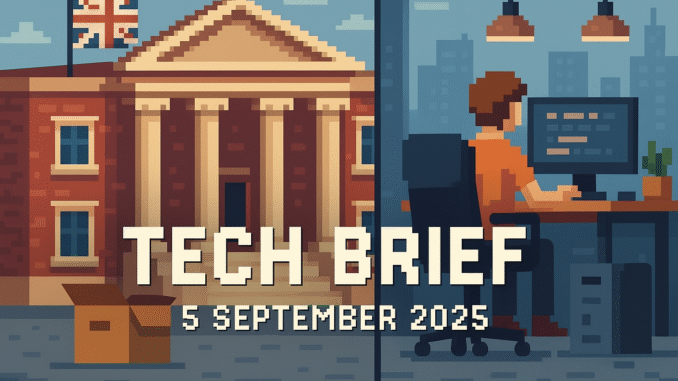
Tech Brief 5 September 2025 isn’t just another roundup. It captures British ambition, awkward questions about legacy, and the friction between invention and nostalgia. Today, we’re looking at a moment of reckoning, from AI leaders stepping down to vineyards innovating quietly, and the ghosts of supercomputers past. Missed yesterday’s Tech Brief? Catch up here before diving in.
Alan Turing Institute CEO Resigns Amid Discord and Direction Change
“Leadership in British tech rarely comes without a side order of crisis.” That’s how a former Bletchley Park program manager put it. Jean Innes is out at the Alan Turing Institute, following a swell of staff unrest and government demands for a strategy overhaul. The institute, named for Britain’s legendary codebreaker, now faces a familiar challenge: living up to its own name.
People inside the field worry this could hollow out another cherished institution. The Turing Institute is known for AI research and national data science efforts. Now it faces internal tensions, external meddling, and the classic British dilemma: is the badge of history a blessing or a curse?
Just as with the old Joint Network Team’s rise and fall, heritage can weigh heavy when modern realities knock at the server room door. If you’ve seen a great name get dragged through a slow, public shake-up, you know the feeling.
UK Pushes for World Lead in AI Assurance
What makes a country the “grown-up” in the AI conversation? This week, the UK government outlined a bold plan: establish itself as the world authority on AI assurance, aiming to guarantee the safety, reliability, and fairness of artificial intelligence applications.
AI assurance means systematic testing, review, and validation before models go into real-world use. Think software audits, data set transparency, and enforceable rules that put the lid on disastrous mistakes. Britain’s pitch isn’t glitzy. It’s safety, not starlight. Sensible, but not showy.
Tech industry voices are split. Some see this as Britain’s chance to turn behind-the-scenes diligence into global influence, like being the international underwriter for AI trust. Others worry about bureaucracy, chilling progress. As the Institute’s own internal struggles show (see above), a legacy for caution can either save lives or stifle invention.
Midjourney Faces Warner Bros Lawsuit for Using Iconic Characters in AI Training
Can nostalgia become evidence? Warner Bros Discovery has sued AI firm Midjourney, arguing their training algorithms fed on copyrighted characters such as Superman and Scooby-Doo.
This legal battle spotlights a strange collision. The cartoons that shaped Saturday mornings are now courtroom exhibits. Warner claims “brazen” digital copying, while Midjourney insists its training methods break no laws. The core issue here: who owns what in the world of AI-generated content, could blow open the future of copyright online.
This isn’t a dispute about vintage tapes or hand-drawn fan art. Billions in licensing are at stake.
If the outcome favours studios, AI firms may need to radically rethink their datasets. If not, that old Pop Culture Zone on your hard drive might get drafted as training fodder for the next big bot.
From the Wayback Machine
On This Day: 1980 – Last IBM Stretch Supercomputer Decommissioned
Forty-five years ago, Brigham Young University powered down the world’s final IBM 7030 “Stretch.” It promised to be 100 times faster than its rivals, yet delivered only 30 to 40 times the speed. Despite the letdown, Stretch’s innovations (such as using transistors, early parallel processing, and multiprogramming) shaped mainframes and microprocessors for decades. The project’s “failure” still lingers quietly in every multiprogramming OS. Some hardware survives in museums, a tangible link to one of computing’s wildest ambitions.
Today’s Big Question
Tech Brief 5 September 2025 leaves one itch unscratchable: can Britain honour legacy and keep daring, or will nostalgia always slow progress? Whether in AI testing or courtroom scraps over Superman, the past doesn’t just haunt, it lingers. What would you risk to be remembered?
Take care of your kit and your ghosts, preferably not at the same time. Tech is memory, after all, but also possibility.
Missed yesterday’s Tech Brief? Catch up here

Leave a Reply